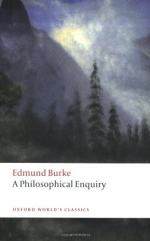
|
| Name: _________________________ | Period: ___________________ |
This test consists of 15 multiple choice questions and 5 short answer questions.
Multiple Choice Questions
1. According to Burke, why is sweetness pleasing?
(a) Because sweetness is a rare, and thus satisfying, sensation.
(b) Because sweetness produces much saliva in the mouth.
(c) Because of the regularity and smoothness of the form of sugar.
(d) Because the first milk of infancy is sweet, and accustoms us to the taste.
2. Which example does Burke use to support his argument regarding the nature of darkness?
(a) A blind boy who regains his sight.
(b) A solar eclipse that frightened townsfolk.
(c) A person who grew afraid of his own shadow.
(d) A dim, murky forest fraught with danger.
3. How does Burke define "gradual variation?"
(a) As the general decline in beauty due to age.
(b) As the rapid changes of an avid mind.
(c) As the sudden movement of line or angle.
(d) As the slight deviation of regular parts.
4. What caveat does Burke offer to his readers about "A Philosophical Enquiry Into the Origin of Our Ideas of the Sublime and Beautiful"?
(a) He bears no resemblance to any kind of contemporary scientific method.
(b) He is writing for political reasons geared to sway minds.
(c) He can only study the immediately sensible qualities of the sublime and the beautiful.
(d) He chooses to omit most of what he truly thinks and feels regarding the sublime and beautiful.
5. How does Burke define "association?"
(a) As a specific group of businessmen.
(b) As a group of words that defines another group of words.
(c) As a set of memories worn into the mind.
(d) As a somewhat friendly acquaintance.
6. Who was Campanella, and for what was he famous?
(a) He was a statesman famous for brokering deals between opposing parties.
(b) He was a soldier-sailor famous for acts of bravery at a crucial battle.
(c) He was a monk famous for mimicking the facial expressions of others.
(d) He was an artist and poet famous for his depictions of ancient Greece and Rome.
7. What, according to Burke, is the state of a man whose teeth are set and whose forehead is wrinkled?
(a) Great pain.
(b) Complete confusion.
(c) Terrible wrath.
(d) Utter delight.
8. Which kinds of colors does Burke argue are essential to beauty?
(a) Bold, vibrant colors.
(b) Soft, clean, fair colors.
(c) Dusky, opaque colors.
(d) Strong, glaring colors.
9. To what does Burke oppose delicacy and fragility?
(a) Dignity and fortitude.
(b) Whining and crying.
(c) Robustness and strength.
(d) Courage and honor.
10. What does Burke criticize about the patrons of proportion?
(a) That they are disproportionate and ugly.
(b) That they are not clear enough in defining proportionality.
(c) That they have not expanded their architectural projects enough.
(d) That they view their own works and views as superior to nature.
11. What, according to Burke, must be utilized regularly lest it/they fall into disrepair?
(a) Dancing, fencing, and painting.
(b) The passions and the understanding.
(c) The skill of speaking another language.
(d) The art of social conversation.
12. How does descriptive poetry operate, according to Burke?
(a) Through verbosity.
(b) Through imagination.
(c) Through imitation.
(d) Through substitution.
13. Why is darkness shocking, according to Burke?
(a) Because darkness is unnatural and unwelcome.
(b) Because the eye and the body do not expect nor appreciate it.
(c) Because darkness is inherently evil and the opponent of goodness.
(d) Because the human brain cannot compensate for darkness.
14. To which human faculty does Burke opine proportion belongs?
(a) To the understanding.
(b) To the imagination.
(c) To the emotions.
(d) To the senses.
15. To what does Burke tie his own opinion of darkness and the sublime?
(a) Intellectualism.
(b) Judgment.
(c) Desire.
(d) Self-preservation.
Short Answer Questions
1. According to Burke, what parts of the mind do beautiful things engage, and how?
2. What visual example does Burke FIRST offer in his explanation of succession and the sublime?
3. How, according to Burke, can we be affected by things we as individuals never experienced?
4. How is blackness different from darkness, according to Burke?
5. According to Burke, what is the mechanical reason darkness is terrible?
|
This section contains 747 words (approx. 3 pages at 300 words per page) |

|




